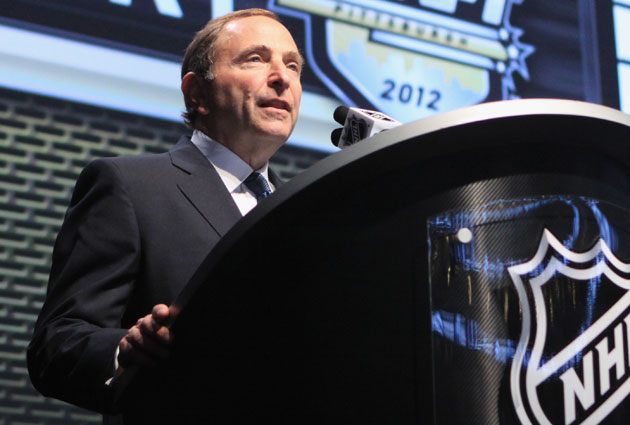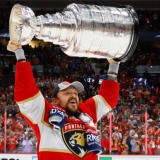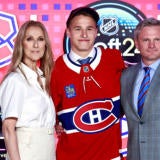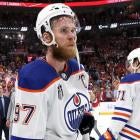 |
| For the third time in league history the NHL officially locked its players out on Saturday night. (Getty Images) |
If it seems like the NHL just did this, that's because it did. If it seems like the NHL always does this, that's because it does.
At 11:59 p.m. ET on Saturday night the NHL collective bargaining agreement expired, and for the third time in league history -- all since 1994 -- the players were officially locked out. Yes, just seven years after the league lost the entire 2004-05 season we're going through this again. It's almost as if you can set your watch to it and know that once a decade the NHL is going to shut down for some amount of time.
On Saturday it was all kind of anticlimactic the way it went down. No formal discussions. No further proposals exchanged. No new deal. At least not yet.
The NHLPA attempted to re-start formal negotiations earlier in the day but was rebuffed by the league because it didn't see any purpose in continuing the talks at the present time. The only things that were exchanged were a couple of official statements, including one from NHL deputy commissioner Bill Daly that said "the Players' Association and players need to take responsibility for future growth of the game and damage they are causing with the hardline position they are taking."
"We spoke today and determined that there was no point in convening a formal bargaining session in light of the fact that neither side is in a position to move off of its last proposal," added Daly in a statement posted on the league's website. "I'm sure we will keep in touch in the coming days and schedule meetings to the extent they might be useful or appropriate. We are sorry for where we are. Not what we hoped or expected."
Of course, if you're a hockey fan it absolutely should have been expected. That is if you're even somewhat familiar with the league's embarrassing history of labor disputes that has included a brief 10-day player strike and now three lockouts over just the past 20 years. Combined they've resulted in nearly 1,700 games being missed (and potentially more to come), more than any other of the four major North American sports.
The issue is the same as it's always been, and always will be when it comes to collective bargaining: money. What to do with it and how to divide it.
| NHL Lockout | ||
|
||
| More NHL coverage | ||
The players feel the biggest issue is the gap between the NHL's richest teams and its poorest teams, and has focused its proposals on revenue sharing to help the teams that are struggling financially. The league kind of agrees, but has different ideas on how that probably should be corrected (James Mirtle at the Globe and Mail broke down both offers last week). Ultimately the league feels the players are getting too much of the pie and that the 30 teams can't continue to pay players what they've been handing out over the past seven years due to increased expenses. This past week commissioner Gary Bettman cited everything from the rising cost of jet fuel to massage therapists.
(Regarding the jet fuel comment for a second, even though it's not a significant issue here it's still kind of funny. Back at the Stanley Cup Final in New Jersey Bettman was specifically asked about possibly switching the playoff format from the current 2-2-1-1-1 series to a 2-3-2 series in an effort to save fuel/energy and travel costs. It was a suggestion that he practically scoffed at it and seemed to dismiss. Now, suddenly, the cost of jet fuel is an issue. For another look at it, Dirk Hoag at On The Forecheck actually took the time to analyze what the NHL pays for fuel and what impact it might have on player salaries … seriously.)
All of this while the NHL's 30 teams continued to freely spend money like drunken sailors right up to the expiration of the CBA, racing to sign players to long-term contract extensions to get them in under an agreement that we've been told by the league is broken. On Friday alone, one day before the lockout started, NHL teams handed out over $100 million in contracts. It continued on Saturday, the very day the lockout started, with $18 million going to Milan Lucic, $20 million going to Cam Fowler, $31.5 million going to Evander Kane, and $15 million going to Kevin Klein. In the month leading up to the lockout nearly $400 million in salary was handed out.
All of those figures of course include the four-year, $21 million deal 36-year-old Shane Doan signed in Phoenix on Friday … with a team that has no owner, is run by the league, and whose future has been in question for years. Makes sense, doesn't it?
The players proposals would ultimately involve their share of revenue decreasing over time, but it's not enough and not fast enough for the league's liking.
That's not to say the league is entirely to blame for the current situation. There are of course two sides to this, and there are no winners now that we're here. Instead of continuing focus on negotiating the NHLPA was spending time this week fighting futile legal battles -- battles that Daly and the NHL referred to as "unnecessary distractions -- in Quebec and Alberta hoping to get the lockout blocked, a fight that it ultimately lost.
The only positive at this point is that hockey fans aren't yet missing anything. The September 15 deadline doesn't really mean a thing because there wouldn't be anything happening at this point anyway. It's still the offseason. It's just bad PR for all parties in an "I can't believe these guys are allowing this to happen again" sort of way.
There is still time to get everything settled and agree to a new deal before any real damage is done. It doesn't start to become an issue until September 21 when NHL training camps were scheduled to open. And then again on September 23 when the exhibition schedule was scheduled to start.
And then, worst of all, on October 11 when the real games are slated to start.
Sadly, if history is any indicator you probably shouldn't worry about having other plans that night because there is a good chance NHL arenas are going to be dark. It's just a matter of how long they will remain that way. A few games? Half a season? A full season?
Either way, the NHL lockout is officially here, and yes, they are doing it again.
For more hockey news, rumors and analysis, follow @EyeOnHockey and @agretz on Twitter and like us on Facebook.



















